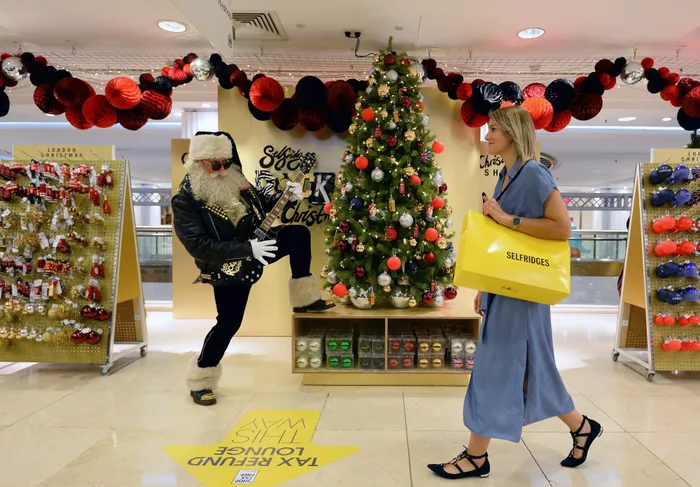South African consumers face a gloomy festive season ahead

Consumers and retailers are both less confident of economic conditions in the third quarter.
Image: Kirsty O'Connor | PA via AP
As retailers roll out their Christmas decorations in what feels like an increasingly desperate bid to entice shoppers, South African consumers are painting a decidedly gloomier picture of their financial prospects heading into the festive season.
Consumer confidence took a sharp knock in the third quarter of 2025, with the FNB/BER Consumer Confidence Index (CCI) retreating from the previous quarter.
At the same time, retailer confidence fell sharply in the third quarter, to the lowest in a year. Retail employs about a fifth of the work force.
This reversal in future-looking confidence comes just as the country's retail sector - which contributes approximately 20% of gross domestic product as part of the broader trade, catering, and accommodation industry - desperately needs consumers to open their wallets.
BER's analysis suggests that while retail sales during the third quarter may still benefit from some consumer resilience, particularly at the higher end, "weak confidence among middle- and low-income households will likely translate into a more notable slowdown in consumer spending over the second half of the year."
The timing couldn't be more sobering. With almost two-thirds of the economy driven by consumption spending, and gross domestic product managing only 0.8% growth in the second quarter of 2025, the consumer malaise threatens to cast a long shadow over the crucial festive trading period.
Sales in the sector are also lower on a monthly basis.
When stripping out inflation against 2019 prices, retail trade sales increased by 5.6% year-on-year. The largest positive contributors were retailers in textiles, clothing, footwear and leather goods.
However, the month-on-month view is less rosy as sales only gained 2.1% between July this year and last. This was, however, off contradictory territory in June and May.
The three-month data shows retail trade sales increased by 3.8% in the quarter to July 2025 compared with the same period in 2024.
"Consumer sentiment was more deeply depressed in the third quarter of 2025," noted Investec chief economist Annabel Bishop.
This highlights how the CCI reading has fallen well below the long-term average of zero.
"Sentiment worsened on both the economic and household financial outlook,” said Bishop.
The pain is particularly acute among middle-income households, whose confidence has plummeted.
Even high-income earners remain trapped in negative territory.
The suitability of buying durable goods sits remained in negative territory, barely improved from the second quarter despite interest rate cuts.
Behind these numbers lies a stark reality: South African consumers are drowning in debt stress.
According to Eighty20, "overdue balances grew twice as fast as total balances compared to the previous year, with overdue loan balances maintaining double-digit year-on-year growth for two consecutive quarters."
More alarmingly, according to Eighty20, "the quarter saw the first growth in the number of loans in default (337,000) since early 2023, suggesting that the credit expansion may be outpacing some consumers' ability to service their debt”.
"With household consumption expenditure receiving a marked boost from credit usage in the second quarter of 2025, credit stress and increasing overdue debt is likely to quell this growth going forwards," Bishop warns.
But scratch beneath the surface and a more troubling picture emerges.
With economists and the South African Reserve Bank expecting GDP growth of around 1% for the full year, the festive season may well determine whether South Africa's consumer-driven economy can maintain even this modest momentum into 2026.
IOL Business